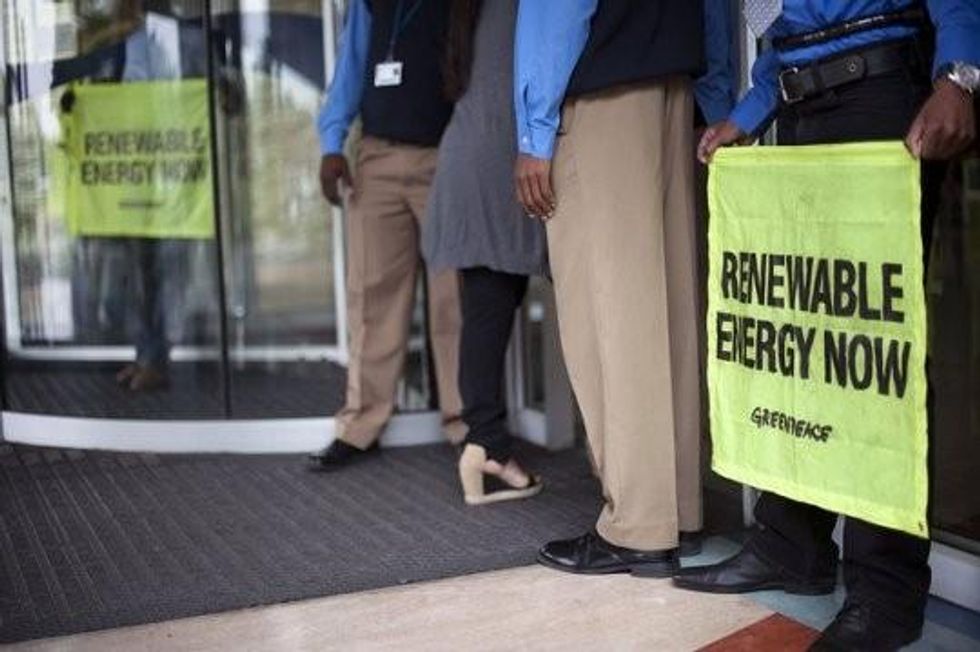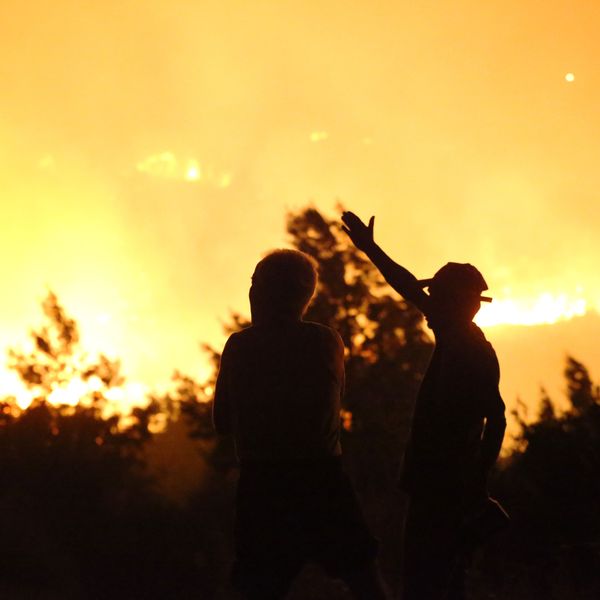Stalling on a Burning Planet: World's Energy as Dirty as it Was 20 Years Ago
"The overall lack of progress should serve as a wake-up call,” says International Energy Agency

"Despite much talk by world leaders, and despite a boom in renewable energy over the last decade, the average unit of energy produced today is basically as dirty as it was 20 years ago," stated IEA Executive Director Maria van der Hoeven.
IEA gave its sobering findings in its annual report to the Clean Energy Ministerial, a forum representing countries that produce 80 percent of global greenhouse gas emissions.
"As world temperatures creep higher due to ever-increasing emissions of greenhouse gases like carbon dioxide - two thirds of which come from the energy sector - the overall lack of progress should serve as a wake-up call," van der Hoeven said.
While the agency noted positive movement in the expansion of renewable energy technologies, such as a 42% growth in solar photovoltaic technology from 2011 to 2012, the agency indicated the world seems to be a prisoner of its own fossil fuel making.
From 1990 to 2010, despite awareness of greenhouse gases fueling climate change, the amount of carbon dioxide emitted to produce a given unit of energy remained nearly unchained, a measure of what it describes as the Energy Sector Carbon Intensity Index (ESCII).
The ESCII was 2.39 tonnes of CO2 per tonne of oil equivalent (tCO2/toe) in 1990, according to their findings. Twenty years later, there was nearly no change at 2.37 tCO2/toe.
Progress on cleaner energy has been "alarmingly slow," the IEA stated, and pointed out the global expansion of coal use has "counter-balanced" any benefits gained from investment in solar or wind power. Van der Hoeven added, "The drive to clean up the world's energy system has stalled."
"We cannot afford another 20 years of listlessness," she warned. "We need a rapid expansion in low-carbon energy technologies if we are to avoid a potentially catastrophic warming of the planet, but we must also accelerate the shift away from dirtier fossil fuels."
_________________________
An Urgent Message From Our Co-Founder
Dear Common Dreams reader, The U.S. is on a fast track to authoritarianism like nothing I've ever seen. Meanwhile, corporate news outlets are utterly capitulating to Trump, twisting their coverage to avoid drawing his ire while lining up to stuff cash in his pockets. That's why I believe that Common Dreams is doing the best and most consequential reporting that we've ever done. Our small but mighty team is a progressive reporting powerhouse, covering the news every day that the corporate media never will. Our mission has always been simple: To inform. To inspire. And to ignite change for the common good. Now here's the key piece that I want all our readers to understand: None of this would be possible without your financial support. That's not just some fundraising cliche. It's the absolute and literal truth. We don't accept corporate advertising and never will. We don't have a paywall because we don't think people should be blocked from critical news based on their ability to pay. Everything we do is funded by the donations of readers like you. Will you donate now to help power the nonprofit, independent reporting of Common Dreams? Thank you for being a vital member of our community. Together, we can keep independent journalism alive when it’s needed most. - Craig Brown, Co-founder |

"Despite much talk by world leaders, and despite a boom in renewable energy over the last decade, the average unit of energy produced today is basically as dirty as it was 20 years ago," stated IEA Executive Director Maria van der Hoeven.
IEA gave its sobering findings in its annual report to the Clean Energy Ministerial, a forum representing countries that produce 80 percent of global greenhouse gas emissions.
"As world temperatures creep higher due to ever-increasing emissions of greenhouse gases like carbon dioxide - two thirds of which come from the energy sector - the overall lack of progress should serve as a wake-up call," van der Hoeven said.
While the agency noted positive movement in the expansion of renewable energy technologies, such as a 42% growth in solar photovoltaic technology from 2011 to 2012, the agency indicated the world seems to be a prisoner of its own fossil fuel making.
From 1990 to 2010, despite awareness of greenhouse gases fueling climate change, the amount of carbon dioxide emitted to produce a given unit of energy remained nearly unchained, a measure of what it describes as the Energy Sector Carbon Intensity Index (ESCII).
The ESCII was 2.39 tonnes of CO2 per tonne of oil equivalent (tCO2/toe) in 1990, according to their findings. Twenty years later, there was nearly no change at 2.37 tCO2/toe.
Progress on cleaner energy has been "alarmingly slow," the IEA stated, and pointed out the global expansion of coal use has "counter-balanced" any benefits gained from investment in solar or wind power. Van der Hoeven added, "The drive to clean up the world's energy system has stalled."
"We cannot afford another 20 years of listlessness," she warned. "We need a rapid expansion in low-carbon energy technologies if we are to avoid a potentially catastrophic warming of the planet, but we must also accelerate the shift away from dirtier fossil fuels."
_________________________

"Despite much talk by world leaders, and despite a boom in renewable energy over the last decade, the average unit of energy produced today is basically as dirty as it was 20 years ago," stated IEA Executive Director Maria van der Hoeven.
IEA gave its sobering findings in its annual report to the Clean Energy Ministerial, a forum representing countries that produce 80 percent of global greenhouse gas emissions.
"As world temperatures creep higher due to ever-increasing emissions of greenhouse gases like carbon dioxide - two thirds of which come from the energy sector - the overall lack of progress should serve as a wake-up call," van der Hoeven said.
While the agency noted positive movement in the expansion of renewable energy technologies, such as a 42% growth in solar photovoltaic technology from 2011 to 2012, the agency indicated the world seems to be a prisoner of its own fossil fuel making.
From 1990 to 2010, despite awareness of greenhouse gases fueling climate change, the amount of carbon dioxide emitted to produce a given unit of energy remained nearly unchained, a measure of what it describes as the Energy Sector Carbon Intensity Index (ESCII).
The ESCII was 2.39 tonnes of CO2 per tonne of oil equivalent (tCO2/toe) in 1990, according to their findings. Twenty years later, there was nearly no change at 2.37 tCO2/toe.
Progress on cleaner energy has been "alarmingly slow," the IEA stated, and pointed out the global expansion of coal use has "counter-balanced" any benefits gained from investment in solar or wind power. Van der Hoeven added, "The drive to clean up the world's energy system has stalled."
"We cannot afford another 20 years of listlessness," she warned. "We need a rapid expansion in low-carbon energy technologies if we are to avoid a potentially catastrophic warming of the planet, but we must also accelerate the shift away from dirtier fossil fuels."
_________________________

